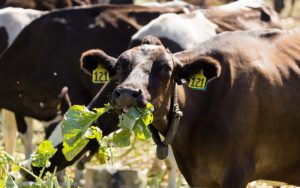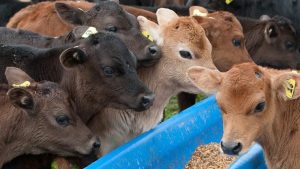
Beef + Lamb New Zealand is encouraging dairy farmers to consider using superior beef genetics at mating this spring to add value to their non-replacement calf crop.
“Dairy farmers will benefit from short gestation lengths, low birthweight calves and ease of calving while beef finishers will benefit from animals that are able to be finished quickly to processor specifications. These calves will also reach weaning weights quicker, saving money and time in the calf barn”
Mr Brier says that quality beef sired calves are essential for a well-functioning dairy beef system.
“We are starting to see changes in the purchasing patterns for beef rearers and finishers. It isn’t good enough to just produce a white-headed or “beef” calf anymore and expect big money from a rearer. With the short gestation, low growth bulls around, buyers are being picky. The Dairy Beef Progeny Test has shown there are bulls from all breeds that can deliver for the dairy farmer and the beef farmer.”
He says the breed of the cow is proving to be less important.
Analysis of the Progeny Test data shows that Jersey cows, mated to top 10 percent beef bulls will produce steers that grow to a better carcass than Friesian cows mated to a bull from the bottom 10 percent of the Dairy Beef Progeny test.
“Don’t forget the bottom 10 percent of the progeny test are still really good bulls – way better than just about anything you could buy to use as a follow-up bull”.
“The message is, if you want to produce really good dairy beef calves, consider using a straw and buying proven genetics. Your rearer and finisher will thank you for it – and come back next year”.
The Dairy Beef progeny test has been run at Limestone Downs and is currently at Pamu’s Renown Dairy near Taupo. Calves are born and subsequently raised at Renown farm, then transferred to other farms within Pāmu’s livestock portfolio for finishing under commercial conditions.
Calving ease, gestation length, birthweight, days to weaning, 200,400 and 600-day weights were all recorded along with carcass data.
“The Dairy Beef Progeny Test has shown that there are sires that deliver right along the supply chain. Taking the time to select these genetics in the lead up to mating this spring will pay dividends in the quality of the non-replacement calf crop and the value of those calves to rearers and finishers,” says Mr Brier.
You can now read the most important #news on #eDairyNews #Whatsapp channels!!!
🇺🇸 eDairy News INGLÊS: https://whatsapp.com/channel/0029VaKsjzGDTkJyIN6hcP1K

























